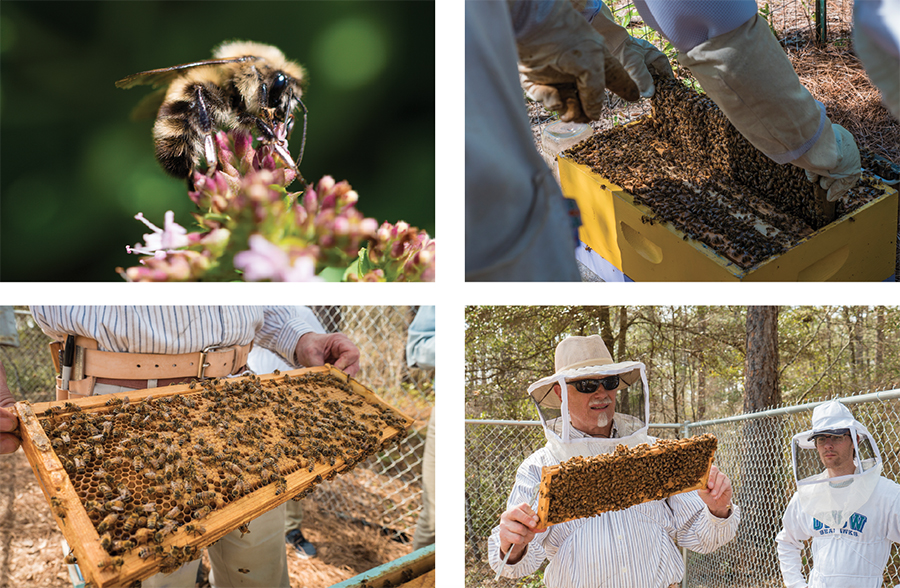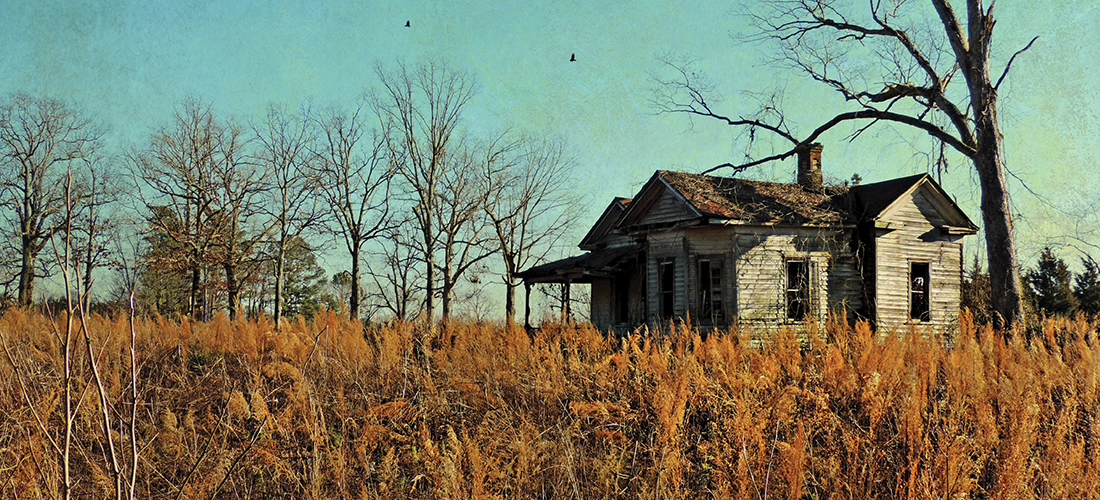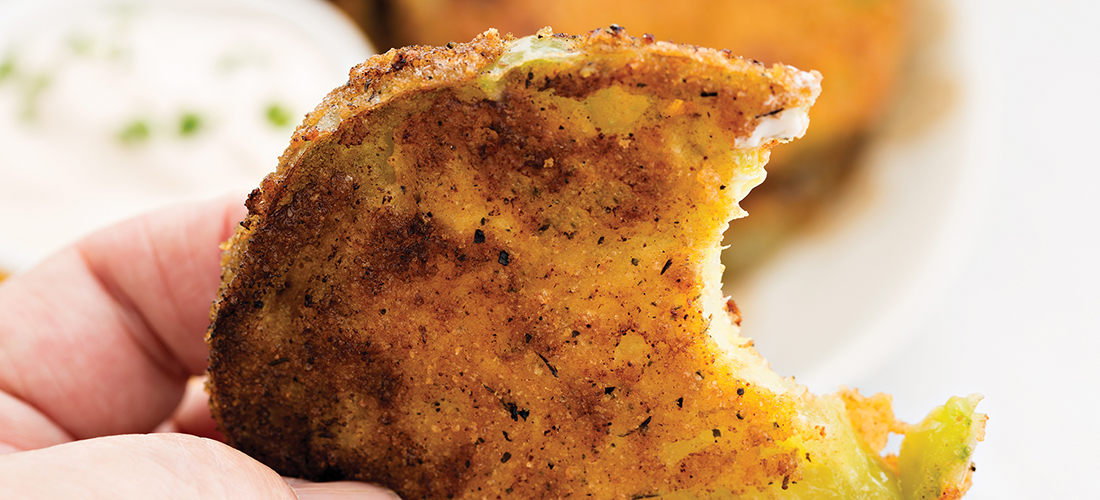A new mentorship program grows interest in beekeeping across the Cape Fear region
By Virginia Holman
When I was a girl, bees weren’t kept by my neighbors. Bees were common and everywhere — humming in fields of Queen Anne’s lace, pollinating my aunts’ vegetable gardens, buzzing in hollow tree cavities, occasionally slipping between the walls of abandoned homes to create their elaborate golden society. Even so, honey came not from family farm stands, but from the Be-Lo grocery store. The plastic bottle was molded in the shape of a little bear with a sporty yellow hat. Sometimes, my father would splurge on a thick glass jar of Florida orange blossom honey, this impulse purchase made because the waxy comb suspended in a sea of amber seemed both exotic and irresistible. Unlike the squeezable bear, the honey in that jar never lingered on the shelf long enough to crystallize. It was sweet, but also had a citrus tang that kept it from being cloying. You could (and I did) eat it by the spoonful.
I never thought much about bees when I was a kid, in much the same way that I never thought about air. Like most people, I took bees for granted. Then, about 10 years ago, beekeepers began reporting that many of their hives had disappeared. Entire colonies of worker bees vanished. This syndrome, dubbed colony collapse disorder, has vexed scientists and alerted us that we cannot take our bees for granted — we depend on bees to pollinate over a third of our crops. When you take into consideration other threats to bee populations, such as pesticides and habitat destruction, you begin to understand that the health of the human community is dependent on the health of the bee population.
As awareness has grown about the plight of the honeybee, many people have become so fascinated by these pollinators that they’ve become backyard beekeepers. With a little education and time, and a modest investment, aspiring beekeepers are often able to set up their first hive or two for $300 to $400.
Tom Rhyne, current president of the New Hanover County Beekeeper’s Association, took a somewhat circuitous route to becoming a beekeeper. “I’ve been a beekeeper for about 15 years. I worked for UPS, and when I had a delivery route in Pender County, I decided that I was going to stop eating all this sugar and start eating healthy. And there was a beekeeper on my route. So I got raw honey and started eating it. Then I changed routes. My new route was near Hampstead, and I lost my honey source. One day I saw all these hives in a front yard near Olde Point. So one day, I walked up, knocked on the guy’s door and said, ‘Can I buy some honey?’ He looked at me and said, ‘Well, no.’ And I shrugged and said, ‘Well, OK,’ and turned to head back to my truck. Then he said, ‘But I can teach you.’ That man, Burt Millette, became my mentor. At that time there wasn’t a club in New Hanover or Pender counties, so I went to one in Onslow near my home. Now, through the New Hanover County Beekeeper’s Association, I mentor other beekeepers.”
The New Hanover County Beekeeper’s Association offers a beekeeping certification course that helps first-time beekeepers learn the basics of beekeeping from master beekeepers, according to Rhyne: “We have a little test at the end where we take students out to one of the member’s apiaries to teach them how to light the smoker, how to open up a colony, what to look for, and to get them comfortable handling the bees.”
Rhyne says that the best time to take a class is early in the new year so you can get your hives set up “before the honey flow starts in April.” Joining a beekeeping club is useful, he says, because it offers access to a community of experienced backyard and commercial beekeepers who can mentor and assist one another.
Beekeeping is also gaining interest among the millennial and post-millennial set. At UNCW there’s a beekeeping club that helps educate and train students about bees and how to handle them. The club currently has five hives on campus, used as a teaching apiary, in a remote, low-traffic location.

Taylor Bragg, the current president of the UNCW Beekeeping Club, says that the club currently has about 120 members and a faculty adviser, Dr. Anthony Snider, professor of environmental sciences. Bragg says that she first became interested in beekeeping when her father acquired a hive. “Beekeeping is fascinating, and there’s something that’s just addictive about it. You become obsessed with your hive. Every time you open it, you wonder, How can I keep them healthy? How can I keep them happy?” This year, she says, the club plans to harvest 100 pounds of honey and sell it as a club fundraiser.
Since she grew up in a farming family, Bragg knows that beekeeping is an important way that people can help maintain robust bee populations. “There are so few feral hives nowadays due to development,” says Bragg. She points out that many cash crops in North Carolina need bees to pollinate them. And in many places in the state, commercial beekeepers will assist farmers by trucking in their hives and renting them as pollinators. It’s a common practice due in part to the size of commercial farms and the unreliability of our native bee populations. But it’s not one without a few risks. Bragg points out that bees transported over long distances experience a great deal of stress. The bees aren’t able to fly around, and the disruption of natural light for several days can alter the bees’ behavior.
David Bridgers, a longtime beekeeper and vice president of the Columbus County Beekeepers Association, has rented out his hives for pollination contracts as a sideline business. Like Bragg, Bridgers admits he became a bit obsessed with beekeeping: “I bought two colonies as nucleus hives in 2000, and I just split and parlayed those into what I have now.” It all began when an extension agent asked him to assist with the pollination of some butternut squash crops in Whiteville. “The grower wanted more colonies, so I kept developing new hives. Then more people started asking for help with pollination, and then I had all these hives. I got up to over 200 hives at one point. Let me tell you,” he laughs, “I went from gainful employment to work when I had all those hives.” He’s shipped bees to Florida and as far as Bakersfield, California, to pollinate crops. These days, he’s scaled back and now has about 100 hives from Hampstead to Whiteville to Porter’s Neck.
At an educational event a few years back, Bridgers says an extension agent told him that “the average age of a beekeeper in North Carolina is between 55 and death.” But now with the mentorship and community outreach of area beekeeping associations and clubs like the UNCW beekeeping club, younger beekeepers are starting their own hives. “Young people want to turn back to nature and are going toward organic gardening. They like to have natural areas in their yards, so keeping bees is part of all that.” So when you discover your neighbor is keeping bees, don’t be alarmed. After all, what gift could be as sweet as honey fresh from the hive?
To find a beekeeping club near you, visit www.ncbeekeepers.org/.
Virginia Holman lives and writes in Carolina Beach.


